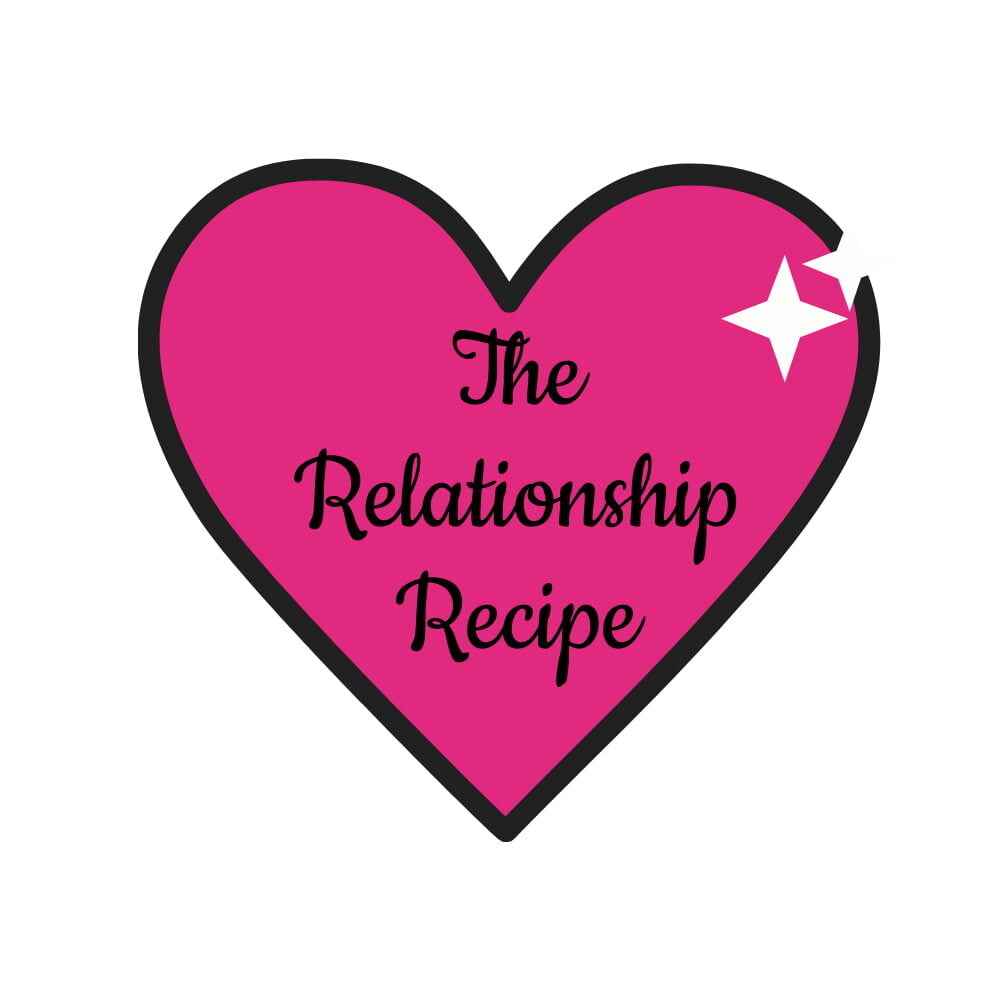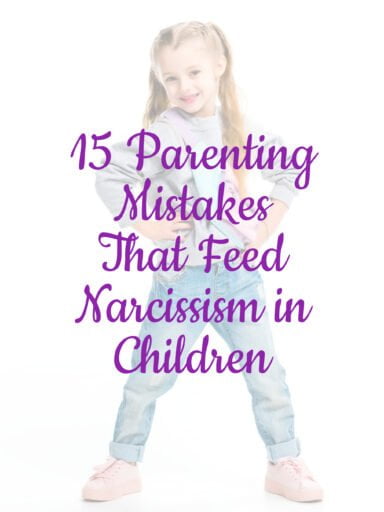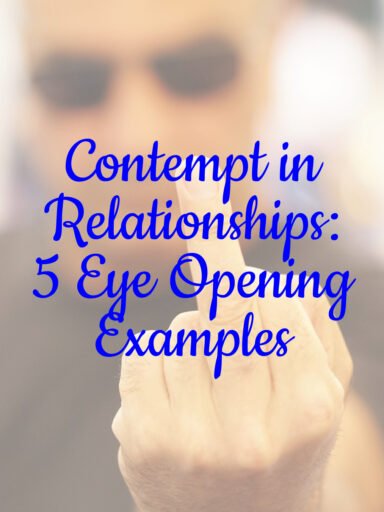I remember the first time I felt that sensation that my body is rejecting someone (also known as “The Ick”.) It was over something really dumb. I went on a date with a guy I worked with that ended up being a total disaster. His mistake?
He showed up wearing corduroy pants.
Yes, that’s the reason my body rejected him, and I felt it physically clenching up inside as soon as I opened the door and saw him dressed like that. I admit, it was super petty of me, but it was the early 90s, and I was in my very early 20s or late teens — this girl had standards! NO one was wearing corduroys back then.
Another thing that happened were my allergies.
He took me to an Italian restaurant and I poured too many of those spicy pepper things on my spaghetti and between those and the allergies, I could not stop sneezing. It was one of the worst allergy attacks I’d ever had. Right in the middle of a packed restaurant.
Really embarrassing.
Once dinner was over, he had plans to take me to a movie. I told him I wasn’t feeling well and just wanted to go home. He whined that he had already bought the movie tickets. Then said maybe he will take his sister.
That was the end of the night.
Although I could barely breathe, and my eyes were watering uncontrollably, I don’t think he believed me.
The next time I saw him at work, he was cold as ice towards me. Can’t say I blame him. I found another job shortly after that, and I never saw him again. Thinking back, I’m sure he made someone out there a great husband. He wasn’t a bad guy. A little emotionally mature, maybe, but not bad.
Live and learn…
Reasons Your Body is Rejecting Someone
When our body is rejecting someone, it might seem to “physically reject” someone for various reasons, but it’s often not a conscious or deliberate choice by the body.
Here are a few possibilities — and some of them are quite fascinating:
- Chemical incompatibility: Our bodies have a complex system of pheromones and chemical signals that influence attraction. Sometimes, we might not be compatible at a chemical level, leading to a lack of physical attraction.
- Immune system incompatibility: There’s some evidence to suggest that our immune systems play a role in attraction. It’s theorized that we’re more attracted to individuals with different immune system genes to enhance the genetic diversity of offspring. In some cases, our bodies might perceive someone as not genetically compatible, though this is subconscious and not something we consciously experience.
- Physical appearance: While attraction is subjective and influenced by cultural and personal preferences, there are certain universal traits that many people find attractive. If someone doesn’t meet these criteria for a particular person, they might not feel a physical attraction.
- Non-verbal cues: Our bodies are highly attuned to non-verbal cues such as body language, facial expressions, and vocal tone. Sometimes, our bodies might react negatively to someone based on subtle cues that we’re not consciously aware of.
- Personality and behavior: Physical attraction is influenced by more than just appearance. Personality, behavior, and compatibility play significant roles as well. If someone’s personality or behavior doesn’t align with what we’re looking for in a partner, it can affect our physical attraction to them.
Overall, attraction is a complex interplay of biological, psychological, and social factors, and our bodies’ reactions to others are influenced by a combination of these factors.
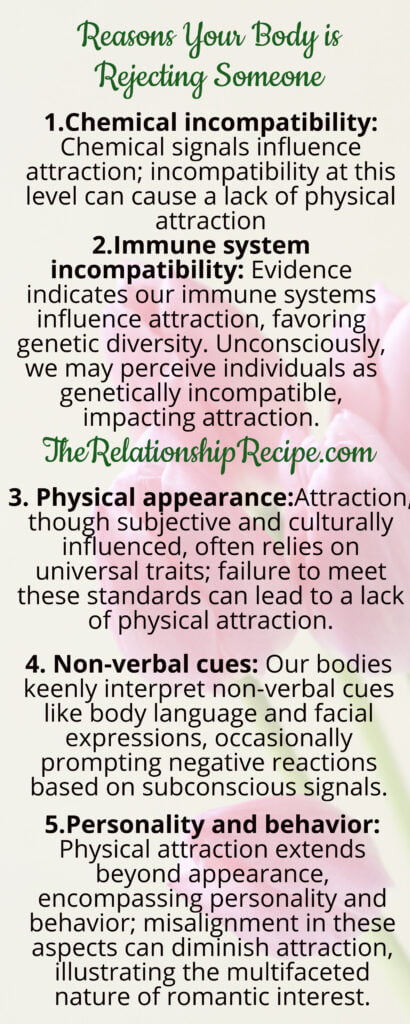
…..
So what are signs your body is rejecting someone, like a date, boyfriend, or partner?
In this article, I will be breaking it down into three main categories: physical, emotional and behavioral.
1. Physical Clues Your Body is Rejecting Someone
Physically rejecting someone isn’t typically a conscious or overt process like rejecting a transplanted organ; instead, it often manifests as subtle cues or changes in behavior. Here are some potential physical signs that your body might be rejecting someone:
Avoidance behaviors: You might find yourself subconsciously avoiding physical contact or proximity with the person, such as leaning away when they try to touch you or creating physical distance in conversations.
Increased stress response: Being around the person might trigger a heightened stress response in your body, leading to symptoms like increased heart rate, sweating, muscle tension, or shallow breathing.
Digestive issues: Stress and discomfort around the person could manifest in gastrointestinal symptoms like stomach pain, nausea, or changes in appetite.
Tension or discomfort: You might notice physical tension in your body when interacting with the person, such as clenched jaw, tight shoulders, or a knot in your stomach.
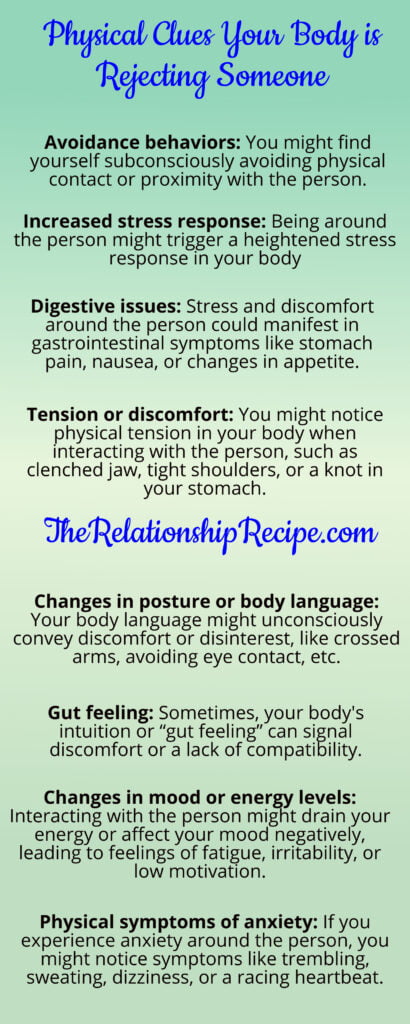
Changes in posture or body language: Your body language might unconsciously convey discomfort or disinterest, such as crossed arms, avoiding eye contact, or turning away from the person.
Gut feeling: Sometimes, your body’s intuition or “gut feeling” can signal discomfort or a lack of compatibility with someone, even if you can’t pinpoint specific reasons why.
Changes in mood or energy levels: Interacting with the person might drain your energy or affect your mood negatively, leading to feelings of fatigue, irritability, or low motivation.
Physical symptoms of anxiety: If you experience anxiety around the person, you might notice symptoms like trembling, sweating, dizziness, or a racing heartbeat.
It’s important to recognize that these physical signs are subjective and can vary from person to person. They don’t necessarily mean that the other person is inherently undesirable or problematic; rather, because your body is rejecting someone, might indicate a lack of compatibility or a mismatch in interpersonal dynamics.
Trusting your instincts and paying attention to how your body responds to different people can help guide your interactions and relationships. If you consistently feel uncomfortable or distressed around someone, it may be worth exploring the reasons behind those feelings and considering whether the relationship is healthy for you.
2. Emotional Clues Your Body is Rejecting Someone
Emotional clues that your body is rejecting someone can manifest in various ways, often reflecting underlying discomfort, unease, or lack of connection with the person. Here are some emotional signs your body is rejecting someone:
Feeling anxious or uneasy: Your body’s stress response might kick in when you’re around the person, leading to feelings of anxiety, nervousness, or discomfort.
Feeling drained or exhausted: Interacting with the person might leave you feeling emotionally drained, tired, or depleted of energy, even if the interaction was brief.
Feeling irritated or agitated: You might notice yourself becoming easily annoyed, frustrated, or irritable in the person’s presence, without a clear explanation for these emotions.
Feeling disconnected or distant: Despite being physically present, you might feel emotionally detached or distant from the person, as if there’s a barrier preventing genuine connection.
Feeling a sense of relief when away from them: You might experience a sense of relief or relaxation when you’re not around the person, as if a weight has been lifted off your shoulders.
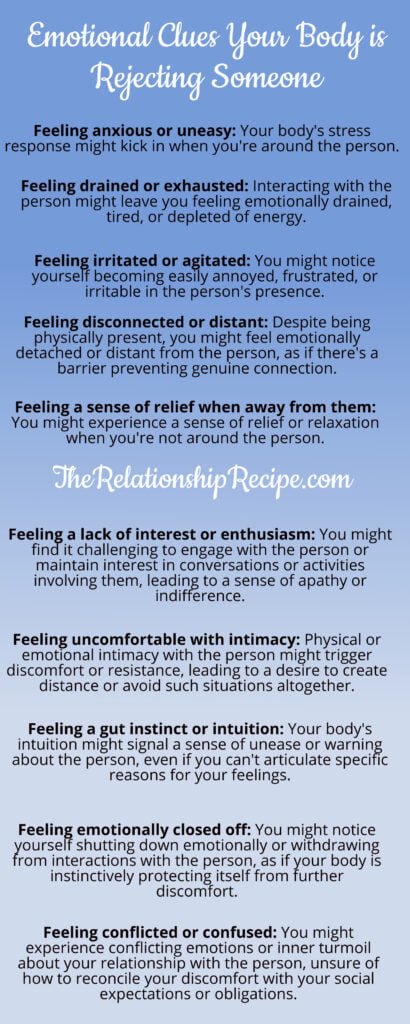
Feeling a lack of interest or enthusiasm: You might find it challenging to engage with the person or maintain interest in conversations or activities involving them, leading to a sense of apathy or indifference.
Feeling uncomfortable with intimacy: Physical or emotional intimacy with the person might trigger discomfort or resistance, leading to a desire to create distance or avoid such situations altogether.
Feeling a gut instinct or intuition: Your body’s intuition might signal a sense of unease or warning about the person, even if you can’t articulate specific reasons for your feelings.
Feeling emotionally closed off: You might notice yourself shutting down emotionally or withdrawing from interactions with the person, as if your body is instinctively protecting itself from further discomfort.
Feeling conflicted or confused: You might experience conflicting emotions or inner turmoil about your relationship with the person, unsure of how to reconcile your discomfort with your social expectations or obligations.
It’s essential to trust your instincts and pay attention to these emotional clues that your body is rejecting someone, as they can provide valuable insights into your relationships and personal boundaries. Ignoring or suppressing these feelings can lead to increased stress, resentment, or emotional exhaustion over time.
3. Behavioral Clues Your Body is Rejecting Someone
Behavioral clues that your body is rejecting someone can manifest in the way you interact with the person and your overall behavior in their presence. Here are some potential behavioral signs that your body might be indicating a rejection:
Avoidance: You may find yourself actively avoiding the person, whether it’s by minimizing contact, finding excuses to leave when they’re around, or steering clear of places where you’re likely to encounter them.
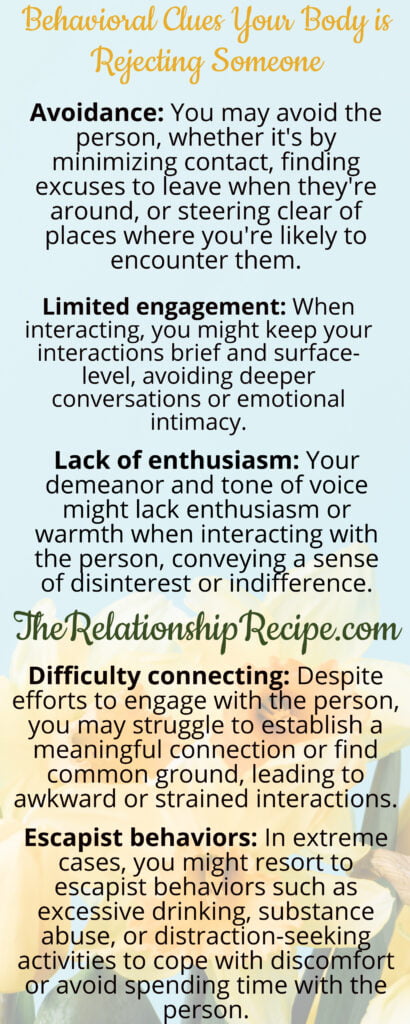
Limited engagement: When interacting with the person, you might keep your interactions brief and surface-level, avoiding deeper conversations or emotional intimacy.
Lack of enthusiasm: Your demeanor and tone of voice might lack enthusiasm or warmth when interacting with the person, conveying a sense of disinterest or indifference.
Difficulty connecting: Despite efforts to engage with the person, you may struggle to establish a meaningful connection or find common ground, leading to awkward or strained interactions.
Escapist behaviors: In extreme cases, you might resort to escapist behaviors such as excessive drinking, substance abuse, or distraction-seeking activities to cope with discomfort or avoid spending time with the person.
It’s essential to pay attention to these behavioral clues, as they can provide valuable insights into your feelings and boundaries in relationships. While it’s natural to experience occasional conflicts or disagreements with others, consistent patterns of rejection behavior may indicate deeper underlying issues that need to be addressed for your well-being and the health of the relationship.
Key Takeaways on if Your Body is Rejecting Someone
Our bodies possess a remarkable ability to communicate subtle cues and signals that reflect our internal experiences and emotional responses to others. When the body is rejecting someone, whether consciously or subconsciously, it can offer a wealth of clues through physical, emotional, and behavioral manifestations.
From heightened stress responses and feelings of unease to avoidance behaviors and closed-off body language, these signs can provide valuable insights into our comfort levels, boundaries, and compatibility in relationships.
Recognizing and honoring these signals is essential for maintaining our emotional well-being and creating healthy connections with others. By acknowledging and respecting when our body is rejecting someone, we can navigate relationships more authentically, establish clear boundaries, and prioritize our own needs and happiness.
Ultimately, listening when the body is rejecting someone, empowers us to cultivate relationships that are supportive, fulfilling, and enriching, while also honoring our individuality and emotional authenticity. By embracing these signals as valuable guidance, we can create spaces of mutual respect, understanding, and genuine connection in our interactions with others.
https://www.tiktok.com/discover/signs-your-body-is-rejecting-your-partner?lang=en
This post may contain affiliate links. I earn from qualifying Amazon purchases at no extra cost to you.
